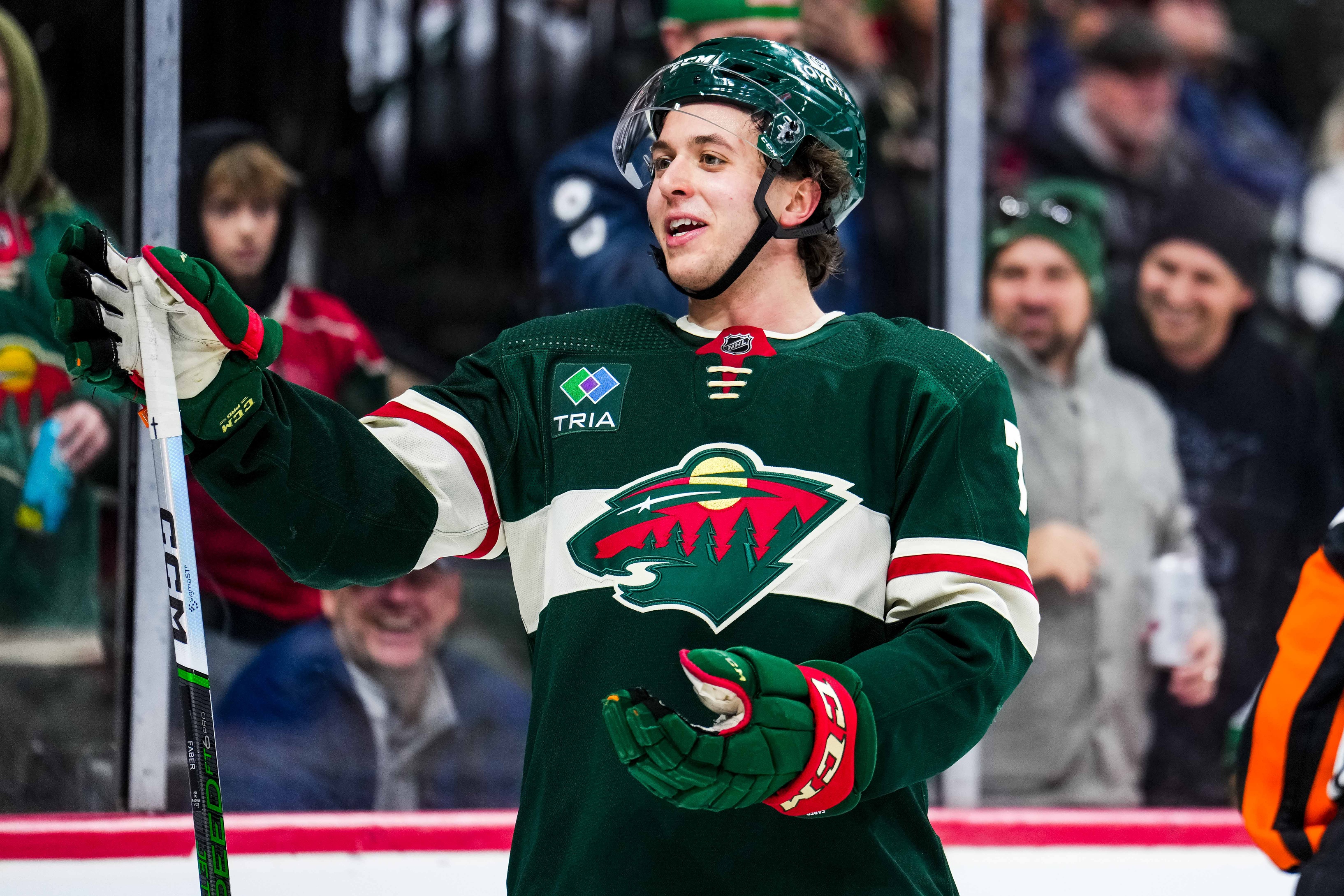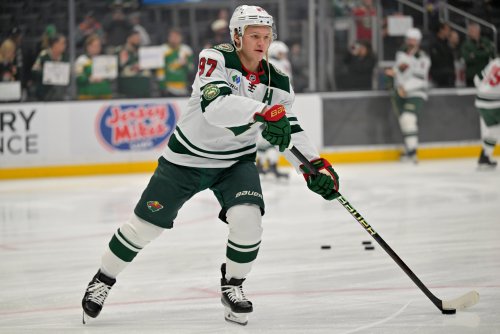
Most NHLers share a similar story. They start as the best players on their teams growing up, taking on a do-it-all role where they're the leading scorer. Then, sometime on their journey to a professional career, they stop being the best player on their team. From there, you need to find your role. Are you a middle-six scorer? Can you hack it in a shutdown role? The answer often determines whether a player is an NHLer or a talented AHL/European league scorer.
This search for a role almost always goes from offense to defense. Unless you're Brock Faber, that is.
With all due respect to fellow Minnesota Golden Gophers Jackson LaCombe and Ryan Johnson, who have played NHL games this year, Faber was always the best defenseman on his college squads. That designation usually comes with heavy offensive minutes and lots of power play time where players can rack up points.
Instead, coaches trusted him so much defensively that they let LaCombe handle that offensive role and let Faber do what he did best. Faber scored only 53 points in 97 college games. How many came on the power play?
Two. One in a regular season contest against Penn State during his sophomore season, the other in the 9-2 romp over Canisius in last year's NCAA tournament. When playing in the US Development Program and international tournaments, Faber was behind the likes of talented defensemen like Luke Hughes and Jake Sanderson. Not much power play time to go around there, either.
But now, Faber finds himself forced into an unfamiliar role: that of an offensive defenseman. Jared Spurgeon has only played 16 games because of injuries that will keep him out for the season. Spurgeon was the beating heart of Minnesota's blueline, especially from an offensive standpoint. With Jonas Brodin often serving in the defensive role, the Wild counted on Spurgeon to lead the team in transition and quarterback the power play.
Now that's Faber's job, and he's responding well to his new role. Going back to his freshman year of college, Faber has already topped his career high in power play points by 800%. Sure, this means his career high is only eight points, but few expected Faber to solidify himself as the Wild's power-play quarterback as a rookie.
We can assume Dean Evason and John Hynes weren't expecting this to happen. Evason seemed concerned about giving Faber too much responsibility too soon, even as Spurgeon's injury and the Calen Addison trade left him with few options. Even under Hynes, it took Faber until December 14 to take on even half of the Wild's power play minutes in a game.
Faber has 73 power play minutes since then, edging out Erik Karlsson and Adam Fox for the most power play minutes from a defenseman during that span. Only Cale Makar, Roman Josi, and Victor Hedman have more than Faber's seven points with the man advantage over that time. Faber's getting those minutes and going toe-to-toe with some of the best in the NHL.
Overall, Faber is earning 5.58 points per hour on the power play, which ranks 17th among the 55 defensemen with an hour or more of power play time. Some defensemen in his range include Brent Burns (5.74 points per hour), Charlie McAvoy (5.48), and Luke Hughes (5.41), interestingly enough.
That's good, but Faber's underlying numbers on the power play are even better. The Wild are scoring 9.93 goals per hour, with Faber quarterbacking the power play, which ranks 12th among those 55 power play defensemen. As for the scoring chances, they more than back up Faber's impact on goals. Faber ranks seventh in the NHL, with the Wild generating 10.92 expected goals per hour with him on the man advantage. Remember, the Wild weren't even that keen on having Faber do this for the first two months of the season.
But now Faber's in control of that top power play spot, with 20 games of being The Guy on Minnesota's top unit. If we take his average of power-play minutes per game and extrapolate that over the 36 games remaining on the Wild's schedule, we should see Faber with about 218 minutes on the season. Where would this rank among under-25 Wild defensemen since 2007-08?
Brent Burns (2007-08; age 22): 253 minutes
BROCK FABER (2023-24; age 21): 218 minutes
Calen Addison (2022-23; age 22): 211 minutes
Matt Dumba (2017-18; age 23): 191 minutes
Jared Spurgeon (2011-12; age 22): 190 minutes
Not only is Faber getting these opportunities, but he's getting them much earlier in his development process than these defensemen who came before him. And it's so much more time than Brodin, the player most people compared Faber to as a prospect.
Brodin's career played out like Faber's college career. He was so good defensively at such a young age that Mike Yeo was content to play him only in defensive situations. It was justified, too. With Suter, Spurgeon, and Dumba all in the fold from early on in Brodin's career, giving the smooth-skating, shutdown defenseman a lot of power play time made little sense.
No one's mad about how Brodin's career played out, but he only topped out at 112 power play minutes (in 2013-14, his age-20 season), which may have stunted his development offensively. We can never know, of course, but we don't have to worry about that possibility with Faber. He's getting the reps and the development he needs to add a dimension to his game early in his career.
It took a massive thing going wrong to get Faber in this position, but the fact that he's there and thriving is a silver lining to Spurgeon's injury. It's also a great case of showing the good things that can happen when the Wild give their young players opportunities to thrive early and often. Perhaps they should note how well this experiment has gone and find ways to repeat this strategy for their incoming youth movement.
All data from Evolving-Hockey unless otherwise noted.
Think you could write a story like this? Hockey Wilderness wants you to develop your voice, find an audience, and we'll pay you to do it. Just fill out this form.
-
 2
2





.thumb.jpg.acd5dedd7251543624c6b47bfa6a1212.jpg)
Recommended Comments
Join the conversation
You can post now and register later. If you have an account, sign in now to post with your account.
Note: Your post will require moderator approval before it will be visible.